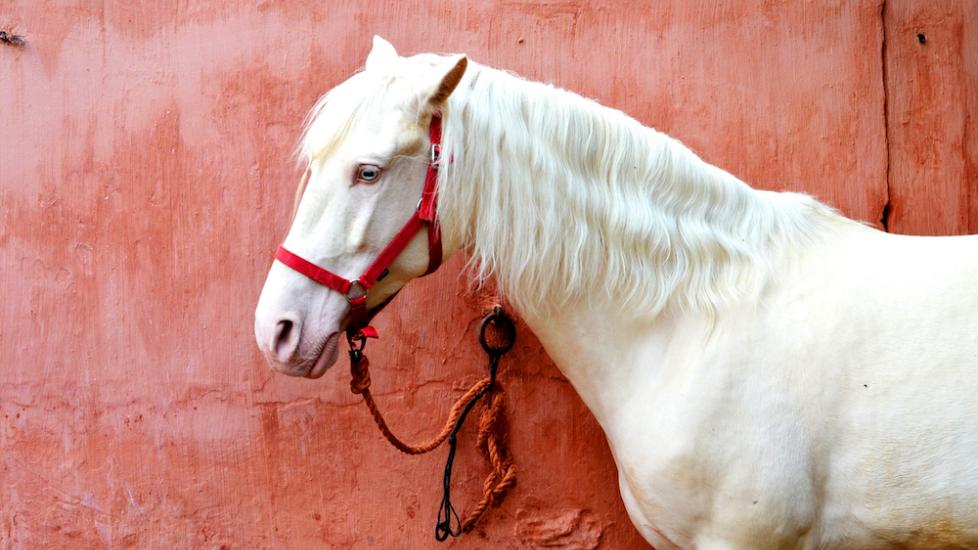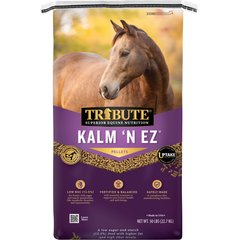Albino
Reviewed for accuracy November 11, 2022.
Though not technically a breed, the Albino horse is well-recognized because of its white coat and pink skin. In fact, any horse—regardless of its bloodline, ancestry, or size—can be classified as an "albino" if it is born with the distinctive white color. Contrary to what some may believe, it is a common type in the United States.
Physical Characteristics
The Albino horse has the distinct characteristics of an animal with albinism, though it is not a true "albino." The biggest distinction is that its pink skin shows through its white coat, that has no grey or cream tint. Possible breeds that may possess these genes include Thoroughbreds, Arabs, Morgans, stock horses, Paint horses, and saddlers. The International Americal Albino Association Inc. (IAAAI) allows horses with a few small colored spots of hair only, not skin, into their registry.
Shop Horse Products
- Tribute Equine Nutrition Kalm N' EZ Pellet Low-NSC, Molasses-Free Horse Feed, 50-lb bag$25.49Chewy Price
- Nutramax Cosequin ASU Powder Joint Health Supplement for Horses, 2.86-lb tub, bundle of 2$279.98Chewy Price
- Absorbine ShowSheen Instant Detangling Hair Polish & Detangler Horse Spray, 32-fl oz bottle$17.84Chewy Price
- Prestige 5 + WNV Vaccine for Horses, 1-mL syringe$53.99Chewy Price
Personality and Temperament
Many of the breeds that can be Albino are intelligent and willing. They are often used for horse shows and public performances, popular for their mind and flashy coloring.
History and Background
The Albino takes its name from the Latin word "Albus," which means white. However, the Albino horse does not have albinism disorder (insufficient melanin production), but is merely white. As such, it is not weak and does not have poor eyesight as some people may claim. In other words, the Albino horse may look like an albino but it is not an albino in the real sense of the word. In truth, the Albino horse is just a white colored horse—nothing more, nothing less.
Historically recognized as a royal mount, only noblemen, heroes, and other affluent members of the royal family had the right to ride the Albino or white horse. So much so, in fact, that the Albino became the rallying point during ancient wars, as it was usually the mount of the commanding officer. For instance, El Cid, (a Castilian nobleman and military leader), used a white horse in legendary battles fought in Spain. Napoleon also had a stable of white horses. Furthermore, many during the Renaissance period commissioned portraits of themselves riding a white horse. Indeed, the white horse is the symbol of elegance, beauty, courage, wealth, and royalty.
Many experts believe the American Albino breed began with a single white stallion named Old King. This white horse sired many white-coated foals even when the mothers of such foals were non-white mares. Old King was purportedly of Arab Morgan extraction, although there are no records to verify this; his lines, size, and proportion, however, were typical of this breed.
It is Old King’s white-coated progeny that the AAHA (American Albino Horse Association), now the IAAAI, accepts in its registry. The modern Albino horse is still mainly used for riding and performance today.
Health and Care
Some Albino colored Paint breed foals can inherit Overo Lethal White syndrome. This is characterized by an incomplete intestinal tract, and the inability to pass manure. This is fatal in every case; breeding should be considered carefully to account for this possibility.
Other white horses take on typical breed characteristics, including their common health issues.
Featured Image: iStock.com/Sara Alami




